News Feature example Iraq
advertisement
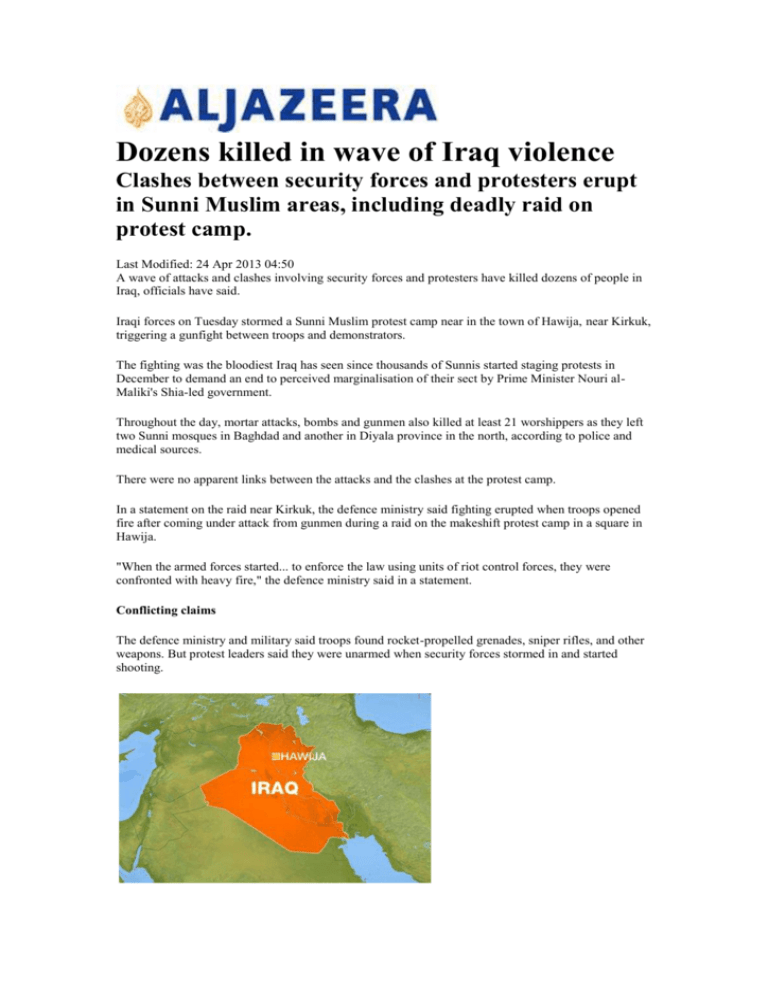
Dozens killed in wave of Iraq violence Clashes between security forces and protesters erupt in Sunni Muslim areas, including deadly raid on protest camp. Last Modified: 24 Apr 2013 04:50 A wave of attacks and clashes involving security forces and protesters have killed dozens of people in Iraq, officials have said. Iraqi forces on Tuesday stormed a Sunni Muslim protest camp near in the town of Hawija, near Kirkuk, triggering a gunfight between troops and demonstrators. The fighting was the bloodiest Iraq has seen since thousands of Sunnis started staging protests in December to demand an end to perceived marginalisation of their sect by Prime Minister Nouri alMaliki's Shia-led government. Throughout the day, mortar attacks, bombs and gunmen also killed at least 21 worshippers as they left two Sunni mosques in Baghdad and another in Diyala province in the north, according to police and medical sources. There were no apparent links between the attacks and the clashes at the protest camp. In a statement on the raid near Kirkuk, the defence ministry said fighting erupted when troops opened fire after coming under attack from gunmen during a raid on the makeshift protest camp in a square in Hawija. "When the armed forces started... to enforce the law using units of riot control forces, they were confronted with heavy fire," the defence ministry said in a statement. Conflicting claims The defence ministry and military said troops found rocket-propelled grenades, sniper rifles, and other weapons. But protest leaders said they were unarmed when security forces stormed in and started shooting. "When special forces raided the square, we were not prepared and we had no weapons. They crushed some of us in their vehicles," said Ahmed Hawija, a student. The defence ministry said what is described as 20 gunmen were killed at the camp along with three of its officers. Sheikh Abdullah Sami al-Asi, a Sunni provincial official, said the fighting began when security forces entered the protest area in the town and tried to make arrests. The raid occurred four days after a checkpoint jointly run by the police and army near the town came under attack. Fighters seized a number of weapons before retreating into the crowd of protesters, according to the defence ministry. Ministers resign Two ministers quit in the wake of the raid on Tuesday, Education Minister Mohammed Ali Tamim and Science and Technology Minister Abdulkarim al-Samarraie. Their resignations bring the number of Sunni cabinet ministers who have resigned since March 1 to four. Agriculture Minister Ezzedine al-Dawleh quit on March 8 after a protester was killed in northern Iraq, and Finance Minister Rafa al-Essawi, some of whose bodyguards were arrested on terrorism charges in December, announced his resignation at an anti-government demonstration on March 1. The arrest of al-Essawi's bodyguards was seen as the main trigger of the Sunni protest movement. Al Jazeera's Jane Arraf, reporting from Baghdad, said demonstrations continue because "a lot of people are being arrested under a very vague and sweeping anti-terrorist law; a lot of these sweeps are happening in Sunni areas. "They are also upset they have no jobs; a lot of Iraqis here were stripped of their jobs because they were affiliated with the former Baath Party." Clashes spread Outrage over Tuesday's raid soon spread through other Sunni parts of the country. Gunmen tried to storm army posts in the nearby towns of Rashad and Riyadh, leaving 13 of them dead, according to defence ministry, police and hospital officials. Demonstrators also clashed with police in the restive western province of Anbar. In Fallujah, mosque loudspeakers urged residents to protest in solidarity with Hawija. About 1,000 took to the streets. Clashes later erupted between gunmen and security forces in the centre of the city, leading authorities to announce an overnight curfew. The United Nations envoy to Iraq called for talks to end violence and Maliki's office said it would set up a commission that included Sunni leaders to investigate the Hawija deaths.
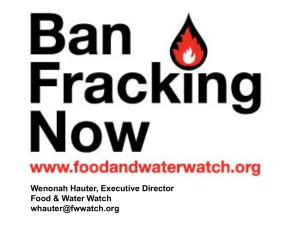
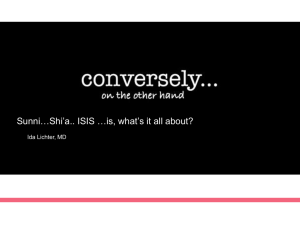

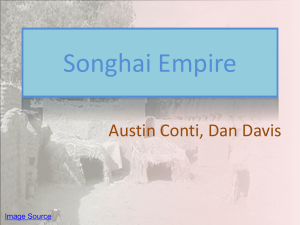
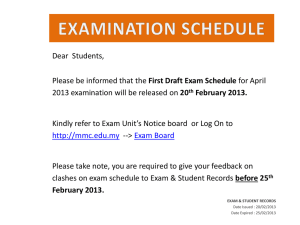
![The Politics of Protest [week 3]](http://s2.studylib.net/store/data/005229111_1-9491ac8e8d24cc184a2c9020ba192c97-300x300.png)

